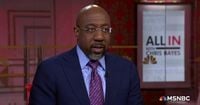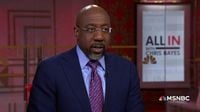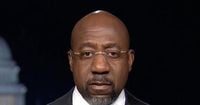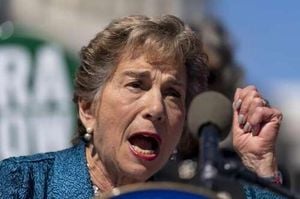On April 22, 2025, Senator Raphael Warnock (D-GA) made a powerful statement during an appearance on MSNBC's "All In," asserting that the Republican Party is "attacking the poor" under the guise of Christianity. Warnock's remarks came against the backdrop of recent budget cuts proposed by the Trump administration, which he argues disproportionately affect low-income individuals both domestically and abroad.
"The most of the anti-Christian bias that I’m encountering is being visited upon us by people who do that in the name of Christianity," Warnock declared, emphasizing a disconnect between the values espoused by Jesus and the actions of those he accuses of misrepresenting the faith. He argued that if the State Department truly aims to defend the faith, it should prioritize the restoration of funding to the U.S. Agency for International Development (USAID), which provides crucial resources to impoverished communities worldwide.
Warnock's comments reflect a growing concern among some lawmakers and activists regarding the moral implications of budget cuts that impact social programs. He stated, "If they want to defend the faith, they ought to defend the poor. That’s who Jesus stood up for." This sentiment resonates with many who believe that the Christian faith calls for compassion and support for the marginalized.
In his critique, Warnock highlighted the cuts to the President's Emergency Plan for AIDS Relief (PEPFAR), which he believes are detrimental to global health efforts. He argued, "They would not cut PEPFAR if they want to do something. I think these draconian cuts to poor people both here and abroad are both anti-Christian and inhumane." His passionate plea underscores a broader debate about the role of government in addressing poverty and the ethical responsibilities of those in power.
As part of his argument, Warnock stated, "I think we are in a moment where Jesus is a victim of identity theft. I don’t know what Bible folks are reading attacking the poor in the name of the faith." This rhetorical flourish aims to provoke thought about the interpretation of Christian teachings and their application in contemporary politics.
Warnock's remarks have sparked discussions across social media, with many expressing support for his stance. Critics of the proposed cuts have rallied around the idea that budgetary decisions should reflect a commitment to helping those in need rather than exacerbating existing inequalities. The senator's comments also align with a growing movement among progressive Christians who seek to reclaim the narrative around faith and social justice.
In recent years, the intersection of faith and politics has become increasingly contentious, with various factions within Christianity interpreting biblical teachings in vastly different ways. Some conservative groups argue that fiscal responsibility and limited government intervention are essential components of their faith, while progressives like Warnock advocate for a more active role in addressing social issues.
Warnock's statements come at a time when the political landscape is marked by heightened tensions over issues such as healthcare, education, and welfare. As debates continue over the future of social programs, the senator's comments serve as a reminder of the moral imperatives that many believe should guide policymaking.
The senator's appearance on MSNBC was not just a critique of the Republican Party but also a call to action for those who share his values. He urged viewers to consider the implications of budget cuts on the most vulnerable populations and to advocate for policies that align with their beliefs.
As the conversation around poverty and Christian values continues to evolve, Warnock's remarks may resonate with a growing number of Americans who are disillusioned with the current political climate. His passionate defense of the poor highlights a critical dialogue about the intersection of faith, morality, and public policy.
In the wake of Warnock's statements, political analysts predict that this issue will continue to gain traction as the 2026 elections approach. With a significant portion of the electorate identifying as religious, candidates who can effectively articulate their positions on social justice and economic equity may find themselves in a stronger position.
Overall, Warnock's comments challenge both political parties to reflect on their values and priorities. As he boldly states, "If the State Department wants to defend the faith and the meaning of the faith, they should restore those cuts to USAID." This call to action not only resonates with his constituents but also invites a broader audience to engage in the critical conversation about faith and its role in shaping public policy.






